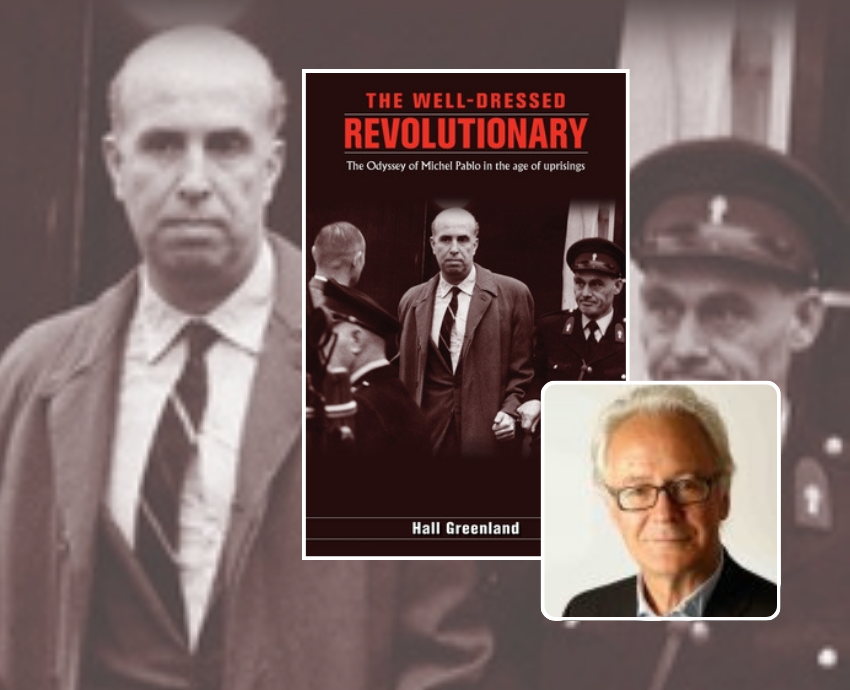
The Well-Dressed Revolutionary: The Odyssey of Michel Pablo in an Age of Uprisings
By Hall Greenland
London, Amsterdam: Resistance Books and International Institute for Research and Education, 2023
376 pp
Australian journalist, historian and political activist Hall Greenland’s biography of Michel Pablo (1911‒96), an Egyptian-born Greek revolutionary leader, is a fascinating and highly recommended read.
Pablo lived through decades of dramatic events, including numerous uprisings and agitations. He was controversial, made mistakes, but was a pioneering Marxist thinker and activist, for example, embracing ecosocialism long before most of the left.
Pablo started as a teenager inspired by the Christian anarchism of Leo Tolstoy, became a Marxist and for decades was a prominent Trotskyist leader. He was an early advocate of the Arab revolution, ecosocialism and feminism. He is perhaps best known for his advocacy of self-management; he was consistent in arguing that a communist society must be based on radical democracy with workers' control of production and decentralised decision making. Unsurprisingly he supported Kurdish selfish determination and would have been a passionate promoter of the Rojava revolution.
His “anarcho-Trotskyism” and every optimistic search for new revolutionary subjects and situations, made him a controversial figure. “Pabloite liquidationism” is a shrill insult still used by some organisations to describe his stance. The biography moves through not just uprisings but disputes, the last of which saw Pablo disagree with his closest allies on whether to dissolve his international organisation, the International Revolutionary Marxist Tendency, and join the movement of global Green parties.
The biography charts a life lived through dramatic events. Pablo joined the Trotskyist wing of the Greek organisation Archeio-Marxists in 1928. He was imprisoned in 1936 by the Greek military dictatorship on an island where he was shunned by the Communist prisoners because of his Trotskyism. He moved to France and organised underground resistance to the Nazi occupiers in 1940, before becoming a leader of Trotsky’s Fourth International during the 1950s. He was highly active in supporting the Algerian War of Independence. A practical revolutionary, he helped build an arms factory for the rebels and throughout his life was known for his skills in forging passports.
Ultimately disappointed after Algerian independence failed to lead to self-management, and the left were expelled from the country, he moved to Chile and acted as an official advisor to Salvador Allende’s socialist government, which was deposed in the 1973 coup.
He was an avid reader, inspired both by Ancient Greek traditions of direct democracy and the more innovative passages of Karl Marx’s Grundrisse. He was also a close reader of Sigmund Freud and Baruch Spinoza. Even in his latter decades he was willing to read more and rethink his ideas.
Greenland’s biography, at more than 370 pages, captures the main events of Pablo’s life and his personality, and there are no dull paragraphs. Given that Pablo split from the Fourth International and continued a bitter dispute with its leader, Ernest Mandel, for several decades, it is refreshing that it has been published by the organisation.
Pablo had his faults and I get the impression he didn’t suffer fools and got into some intense disputes. The biography is frank about his failings, but you warm to him with every page you read.
There is sometimes a sectarianism on the left, where we criticise every organisation bitterly except our own. Pablo perhaps moved to the opposite extreme, he was constantly looking for new opportunities to support struggles. His greatest weakness was, perhaps, an excess of revolutionary optimism.
This book might seem like a present for those of us interested in obscure episodes in Trotskyist 20th century history; however it has something for all of us who want to see a better world. There are plenty of lessons to learn (perhaps being practical and non-dogmatic) and a lot of hope despite the defeats endured.
What I liked about Pablo was his ability to learn from Russian revolutionary Vladimir Lenin and Marx, while applying their analyses to new situations. His full-on engagement with anti-colonial movements is very positive.
However, reacting against top-down rule, Pablo was almost an advocate of non-organisation, a kind of anarcho-Trotskyism. Hall notes: “The trouble with the pablistes, maintained Jean-Pierre Hardy, a critical communist for self-management, was that they tended to make a fetish of non-organisation” (page 332).
Without going overboard on discipline, a somewhat more organised approach seems necessary if revolution, or even modest reform, is to be achieved.
Here in Britain,I was active in the small Pabloite group, Socialist Self-Management, in the late 1980s and early ’90s. I didn’t really know anything about Trotskyism, but it was the first group I came across on the revolutionary left who were engaged with green issues, which was an attraction for me.
I am not sure if Pablo ever got to Australia, but Pabloites were active in the country, most notably Nick Origlass, a trade unionist and socialist mayor of Leichhardt in Gadigal/Sydney. Hall covers a little of the English side of things, but has nothing on Australia. I think this is my only criticism of a very thought-provoking and enjoyable book.
Perhaps it is time to reclaim the insult “Pabloite liquidationist” as a description of those engaged in militant, practical and open revolutionary struggle?